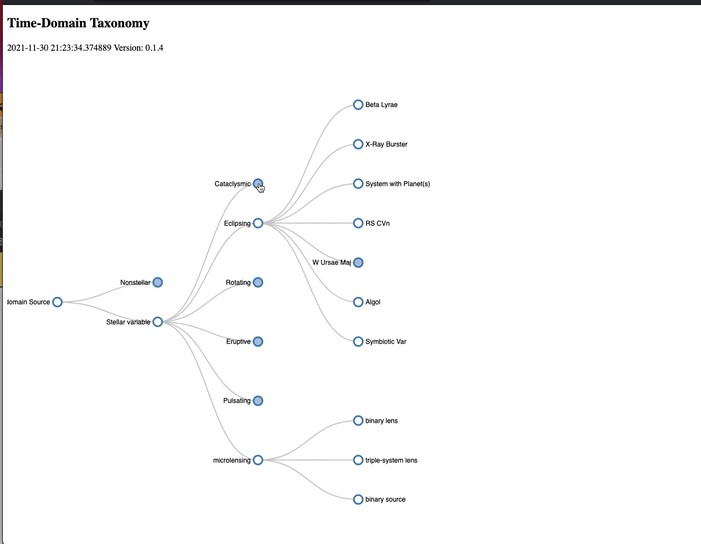This project helps us track and version a taxonomy for astronomical time-series sources, for transients (e.g., supernovae and tidal-disruption events), continuous variables (e.g., QSOs) and variable stars (RR Lyrae, δ-Scuti). It is open source and we welcome PRs to change/update this taxonomy as need be.
The generic structure is human-readable YAML and looks like:
class: Supernova
comments: |
This is a diverse class of explosions related
to the end-of-life of stars.
links:
- https://astrobites.org/2016/12/02/classifying-supernovae/
- https://en.wikipedia.org/wiki/Supernova
tags: [explosive, transient]
other names: [SN, sn, sne, supernova, supernovae]
subclasses:
- class: Type I
tags: [hydrogen poor]
other names: [SN Type I]
subclasses:
- class: Ia
tags: [white dwarf, cosmology, thermonuclear]
other names: [Ia-p, SN Ia, SNIa, supernovae Ia, SNe Ia]
subclasses:
- class: Ia-pec
tags: [peculiar]
other names: [SN Ia-pec, SNIa-pec, Ia-p]
...There are two ways to describe the class. Either refer to another YAML file:
- class: Stellar variable
subclasses:
- ref: cataclysmic.yaml
- ref: eclipsing.yaml
- ...or define the classes outright:
- class: Novae
tags: [binary]
subclasses:
- class: Classical Nova
other names: []In this case only the class name is required at each level. Other keys (subclasses, comments, tags, other names, and links) are allowed but not required. The schema is created such that the classification hierarchy is nested: each member of the subclasses array is itself a class. The idea of tags is to allow for a query of different class members throughout the taxonomy by a similar observation or physical inference (e.g., a search on cosmology could return both Ia and IIP supernovae).
Using pypi:
pip install -U tdtaxOr Directly from Github:
git clone https://github.com/profjsb/timedomain-taxonomy.git
cd timedomain-taxonomy
pip install .
To get the taxonomy, after installation, as a Python dict:
import tdtax
from tdtax import taxonomyThis will merge all the YAML taxonomy files referred to in the top.yaml file and check to make sure that the taxonomy is validate against the schema.
To output the current taxonomy to a webpage that can be interactively traversed:
import tdtax
tdtax.write_viz(tdtax.vega_taxonomy, outname="viz.html")This will write a file viz.html which can be viewed in your browser. The tags associated with each node is shown upon hover.
The taxonomy is captured starting the file tdtax/top.yaml. It refers to other YAML files which contain classification hierarchies for subclasses.
Upon import tdtax the taxonomies are merged into a single JSON tree and this is validated against the schema file tdtax/schema.json. Before a PR, test to make sure that taxonomy validates against the schema by running the tests:
pytestThis uses PyYAML to validate the taxonomy against the schema. When you make a PR, your branch will be automatically be tested with Travis CI.
To learn more about taxonomy of variable stars and explosive transients we suggest the following links:
- "Variable stars" from CSIRO Astronomy and Space Science
- Variability types from GCVS
- Supernova classification (astrobites) from A. Villar
We thank the Gordon and Betty Moore Foundation for a Software SkyPortal grant which covered the cost of the development of this project.

